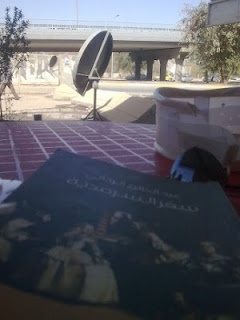Yaseen Taha Hafuth, an Iraqi poet and translator of
literature, was writing in yesterday's Al-Sabah issue. The title of his article
was "The Anxiety of Falling". It started with that usually antagonism
to the biological theories of psychiatry. As structuralism was decomposed, a
poetic writing prevailed. It is not me who is supposed to be fascinated with
such an article, but a little degree of empathy had found itself inside at that
particular moment and another dose of empathy, or even sympathy, had caught the
possibility of existence in the future when a better explanation for the
normality of the anxiety of falling will be read from another source.
 Falling, as a concept, had pointed to two facts: 1. The
coming Arabic Summit, that will be held in Baghdad in about a week, and 2.
Falling of an elderly body and hip fracture. As I contemplated Yaseen Taha
Hafuth face, I knew his body is not that youth, anymore.
Falling, as a concept, had pointed to two facts: 1. The
coming Arabic Summit, that will be held in Baghdad in about a week, and 2.
Falling of an elderly body and hip fracture. As I contemplated Yaseen Taha
Hafuth face, I knew his body is not that youth, anymore.
I always think about the bed I will lie in while knowing
that I am in my last days. What will I think when I will be diseased and
expecting death at any moment. Will be satisfied with what I did in my life?
Could I have said, at that moment, that I have lived?
Yaseen Taha Haduth talks also about the anxiety of
"living" and the anxiety of "fate". About the necessity of
anxiety to motivate living and creating and thinking. This article will be read
in the future again and again. Thank you Yaseen Taha Hafuth.
Have you ever heard of an Iraqi pantomime? A pantomime
entitled "The Sculptor is Watching his Watch"? Written and directed
by an Iraqi called Muna'im Sa'eed?
Ali Shia'a was
writing yesterday in Al-Sabah about it. Ali Shi'a was talking about his
memories of 1991 when the Gulf War ended and he was forced, with others, to
leave Iraq to K.S.A. and be refugees in an asylum, in tents in the Saoudian desert.
Fa'is Al-Banna was among those Iraqis and he had reproduced this pantomime in
front of the others asylum seekers, from his memory. The article tells us that
that pantomime was forbidden to be played anymore.
Donald Rumsfeld 21st episode of his
Memoir was neglected again for the sake of reading Ali Daneef who was writing
about his son showing signs of falling in love. 
Ali Daneef is embarrassed in front of his son's new care
about his hair and clothes and poetry. The article is very beautiful. Next to
the article is a fresh photo from Paris, where the weather was hot a little making
people sitting in the terraces again.
Another article was talking about the Mothers' Day in the
Sumerian days which was regarded as the first of April, in a link to what the
Sumerian thought the start of spring which symbolizes fertility for them. A
picture with the article is showing a typical mother in traditional clothes
selling vegetables.
Happy Mothers Day to all Iraqi mothers and all mothers around the world.
Hope all the best to Ali Daneef's son.
Thank you Ali Shiay'a about that wonderful story about the Iraqi pantomime.
Yaseen Taha Hafuth, you are a master that we learn from.


.jpg)
.jpg)
.jpg)

.jpg)


































